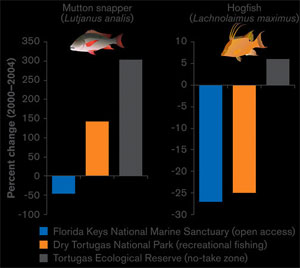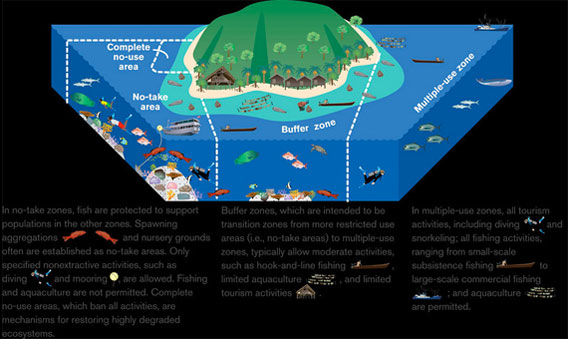Marine managed areas in developing countries can help reverse declining fisheries while generating long-term benefits for communities, according to a series of reports released by Conservation International (CI).
The reports, informed by more than 50 studies and 100 scientists in 23 countries around the world since 2005, evaluate the role of marine managed areas (MMAs) in maintaining ocean health, assess the link between sustainable ocean use and human well-being, and architect what it takes to successfully implement MMAs.
 Courtesy of CI |
“The ocean is in crisis, and the events we are witnessing at particular sites like the Gulf of Mexico are not isolated, random incidents – but rather, symptomatic of the increasing strain of human activities,” said Dr. Leah Bunce Karrer, co-author and Director of Marine Management Area Science Program at CI, in a statement. “Now, we have a solution which could significantly reduce ocean degradation. It could actually revolutionize our relationship with the ocean.”
The reports argue that MMAs will be critical to halt continuing the decline in marine fisheries.
“The fact is, one-in-five grouper species, one-in-three species of sharks and rays, and one-in-three species of reef-building corals, are facing extinction. Most people don’t realize that,” said Dr. Gregory Stone, Chief Ocean Scientist and Senior Vice President for Marine Conservation at CI. “As species disappear, entire ecosystems are altered in negative ways we don’t even want to imagine.”
“So the message for coastal communities is this: if you want access to these resources tomorrow, you have to take care of your backyard today.”
The reports were produced by a global network of 75 organizations known as the “Science-to-Action” partnership, primarily under a grant from The Gordon and Betty Moore Foundation. Key partners include: the Smithsonian Tropical Research Institute, National Geographic, the University of British Columbia, Boston University, Duke University, the University of South Pacific, the World Fish Center, the University of Belize, the Healthy Reef Initiative, and the Fiji Locally Managed Marine Area Network.

Courtesy of CI
The reports:
- Living with the Sea examines the role of Marine Managed Areas in helping ocean species adapt, and even bounce back from, the increasing human impacts caused by global climate change and unsustainable development.
- People & Oceans highlights the direct connection between a healthy ocean and human wellbeing, which include improved livelihoods, better food security, and increased support for cultural traditions.
- Marine Managed Areas: What, Why, and Where lays out a roadmap to successfully implement and navigate the challenges of new MMAs.
Related articles

As a tiny island nation makes a big sacrifice, will the rest of the world follow suit?
(09/15/2010) Kiribati, a small nation consisting of 33 Pacific island atolls, is forecast to be among the first countries swamped by rising sea levels. Nevertheless, the country recently made an astounding commitment: it closed over 150,000 square miles of its territory to fishing, an activity that accounts for nearly half the government’s tax revenue. What moved the tiny country to take this monumental action? President Anote Tong, says Kiribati is sending a message to the world: ‘We need to make sacrifices to provide a future for our children and grandchildren.’







